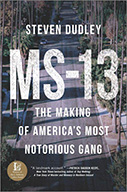MS-13: The Making of America’s Most Notorious Gang

Author: Steven Dudley
Publisher: Hanover Square Press, 2020. 352 pages.
Reviewer: Jonathan D. Rosen ǀ March 2022
In the United States, there are around 10,000 MS-13 members who operate in 40 states. The strongholds are Los Angeles, New York, and the Washington D.C. area. It, however, is important to mention that the United States has 33,000 gangs and more than 1.4 million gang members.
The MS-13 gang has been elevated on the security agenda of the United States government. Former President Donald Trump, for instance, contended that his administration was “liberating” towns from MS-13. The Trump administration often intermixed the terms drug cartel and gang, which, by definition, are very different enterprises.
Even among academics who specialize in gangs, there are many questions about how to define MS-13? Is this criminal group a third-generation gang? Are they a transnational organized crime group or an urban guerilla movement? Scholars disagree, and this debate has filled the pages of many peer-reviewed journals.
Steven Dudley provides an excellent history of the origins and evolution of MS-13. Many El Salvadorans fled the violent civil war, which led to more than 75,000 civilian deaths. Despite the many myths, the fact is that MS-13 was founded in Los Angeles in the 1980s. Youth living in Southern California were often bullied for not speaking English or even for their accents in Spanish. The gang provided them with friendship and protection.
The United States began deporting back to El Salvador and other Central American countries MS-13 members in the 1990s, with the passage of the Illegal Immigration Reform and Immigrant Responsibility Act. The United States government, however, failed to share information with the governments in Central America. Consequently, gang members returned to the Northern Triangle countries and the gang ballooned.
Dudley’s book is a must-read for anyone wanting to understand the nature of MS-13. The book is a fascinating read, as the author combines his experience working as a researcher and journalist. He has spent years traveling around Latin America and studying gangs, organized crime, and drug trafficking.
This is a well-written and entertaining work — based on empirical research, and not on hearsay. It will interest not only academics and policy analysts, but also the general reading audience wanting to learn more about this gang.
Jonathan D. Rosen is Assistant Professor in the Professional Security Studies Department at New Jersey City University.


